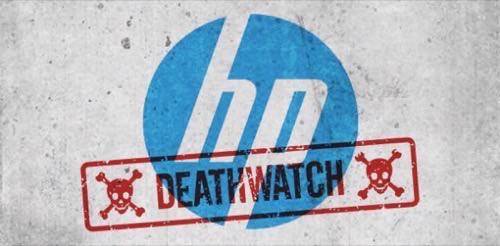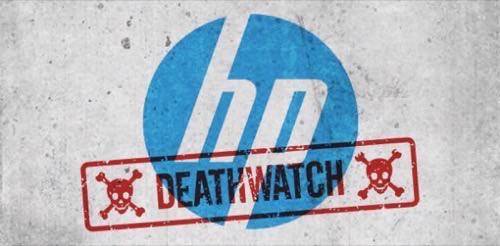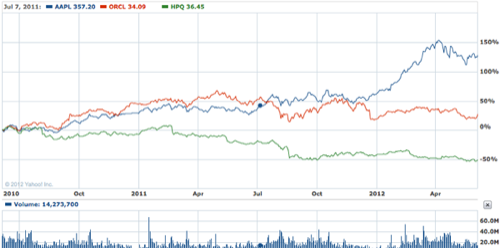
For the second installment of ReadWriteWeb’s new DeathWatch series, we cast a beady eye on Hewlett Packard. Let’s be clear: Unlike our first DeathWatch victim, HP is not about to go out of business anytime soon. But momentous market changes – not to mention an epic series of fumbles, miscalculations and missed opportunities – presents the iconic company with serious long-term challenges that could eventually put an end to HP as we know it.

The Basics:
Like IBM in the 1980s and ’90s, HP does a little bit of everything, and quite a lot of some things. In the consumer space, it’s best known for laptops, printers and recent forays into smartphones and tablets. For enterprises, HP adds data management and security services, consulting services, and just about every other kind of hardware, software or service a business could need. It’s even maintained a proprietary version of the UNIX operating system for nearly 30 years.

All told, HP employs more than 300,000 people around the world, sells into 170 countries, and produced more than $127 billion of revenue in 2011. It is the biggest PC maker in the world, produced almost $10 billion in quarterly profit in Q4 2011, and finished the year with more than $8 billion in the bank.

The Problem:
So why is HP on the ReadWriteWeb DeathWatch? In large measure, HP’s success is based on dominating industries that are no longer seen as the cutting edge of technology. To many, the title of “Biggest PC maker” is an albatross in a world where even Microsoft is pushing tablets and smartphones as the future of computing.
Less than a year ago, HP itself was considering exiting the personal systems business by exploring “strategic alternatives, including the exploration of the separation of its PC business into a separate company through a spin-off or other transaction.” On the enterprise side of its business, consumerization and cheap cloud services are moving sales out of the traditional IT channels HP has long targeted.
HP has also gone through three CEOs (and one sexual harassment probe) in two years, invested billions in and subsequently torpedoed a tablet line, and flip-flopped on its support for WebOS. As a result, the stock price has dropped nearly 50% over the past 24 months, while its competitors have seen gains.
The biggest sign of trouble? Just last month, HP announced 27,700 layoffs, a 31% decline in profits and a 3% decline in revenues.
The Players:
HP has bet the farm on Meg Whitman, best known for her 9-year tenure as eBay’s CEO (and a spectacularly expensive failed run for governor of California). Despite some second-guessing of her decision to buy (and later sell) Skype while at eBay, Whitman is generally regarded as a strong leader with good business sense, and she’s known for tackling problems head-on and being willing to take a stand.

At the HP Discover 2012 conference in Las Vegas this week, Whitman did just that, acknowledging that “the kind of turmoil the company has had at the top of the company can take a toll on companies, employees and shareholders,” then pledging to move past the static and get her company focused on a long-term turnaround that could take four to five years.
The Prognosis:
At the Discover show, Whitman drew a line in the sand and reinforced the company’s decision to stay in the hardware business. “Our foundation is infrastructure – PCs and printing, servers, storage and networking. This is a differentiating strength for HP, and one we should be incredibly proud of.” She addressed the issue of commoditization in HP’s core businesses, saying, “With the right R&D, with the right customer connections, we ought to be able to stay ahead in this most important element of the business.”
Some direction is better than none, and it’s probably wise to try to leverage a business that still provides 70% of your company’s revenues. But the market won’t get any kinder to HP’s current strengths, and the company still lacks a cohesive leadership strategy in rapidly growing technologies like tablets and smartphones. If it can’t move beyond also-ran status in these critical areas, HP’s claim to layer services on the world’s strongest hardware stack will begin to sound hollow, and its business will continue to erode.
Can This Company Be Saved?
HP has substantial problems, but it still has plenty of resources, too. Success or failure boils down to whether Whitman is making the right call by sticking to the “soup-to-nuts” theme, and how well she can drive the growth and acquisitions necessary to fill in the gaps.
But HP doesn’t seem to be leading in the high-growth areas of technology, and is increasingly seen as a vendor of commodity products.
While bundling hardware, software and services for enterprise customers still works well for competitors like Oracle, Whitman must focus her company on providing a logical suite of products that truly addresses customer needs (and not simply HP’s traditional strengths).
If successful at this strategy, HP could continue to make piles of money for a long time. And there are worse fates than being a cash cow. But it’s hard to see a path where HP regains its place among the technology leaders.
ReadWriteWeb’s DeathWatch series highlights businesses and technologies facing potentially life-threatening challenges. Each week we examine a vulnerable company, check for a pulse and look at its chances for recovery.
Victims So Far:
Research In Motion: no change in status










